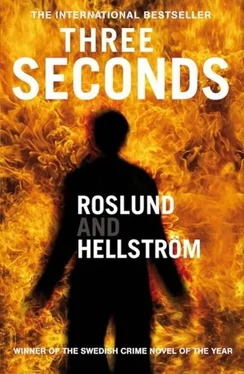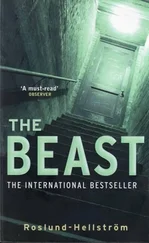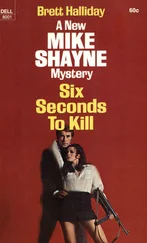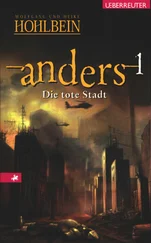"You're prickly."
"I haven't shaved yet."
"You're more prickly than normal."
Bowls, spoons, glasses. They all sat down, Rasmus's chair still empty, but they would leave him to sleep as long as he needed to.
"I'll take them today."
She had expected him to say that. But it was hard. Because it wasn't true.
"The whole day."
The set table. Not so long ago, nitroglycerine had lain there beside some pentyl fuse and a loaded gun. Now it was laden with porridge and yogurt and crispbread. The cornflakes crunched noisily and some orange juice was spilled on the floor. They ate their breakfast as they usually did until Hugo banged his spoon down on the table.
"Why are you angry with each other?"
Piet exchanged glances with Zofia.
"We're not angry."
He had turned to his oldest son as he spoke and instantly realized that this five-year-old was not going to be satisfied with a platitude and therefore decided to hold his challenging eyes.
"Why are you lying? I can tell. You are angry."
Piet and Zofia looked at each other again and then she decided to answer.
"We were angry. But we're not anymore."
Piet Hoffmann looked at his son with gratitude and felt his shoulders dropping. He had been so tense, longing to hear those words, but he hadn't dared ask the question himself.
"Good. No one's angry. Then I want more bread and more cornflakes."
His five-year-old hands poured more cereal on what was already in his bowl and put some cheese on another slice of bread which then lay next to the first one that hadn't even been started yet. His parents chose not to say anything. This morning he was allowed to do as he pleased. He was wiser than they were right now
He sat on the wooden step by the front door. She had just left. And he still hadn't said what he needed to say, it just hadn't worked out that way. Tonight. Tonight he would tell her. About everything.
He'd given Hugo and Rasmus a dose of Calpol as soon as her back had disappeared down the narrow path between the Samuelssons' and Sundells' houses. Then half a dose more. Thirty minutes later their temperatures had dropped and they were dressed and ready for nursery.
He had twenty-one and a half hours left.
Piet Hoffmann had ordered Sweden's most common car, a silver Volvo. It wasn't ready, neither cleaned nor checked. He didn't have time to spare, so instead chose a red Volkswagen Golf, Sweden's second most common car.
Someone who doesn't want to be seen or remembered should stand out as little as possible.
He parked near the churchyard and fifteen hundred meters away from the enormous concrete wall. A long and open decline all the way down, meadows of grass that were green but not that tall yet. That was where he was going. Aspsås prison, one of the country's three high security prisons. He was going to be arrested, held on remand, prosecuted, sentenced, and locked into a cell within the next ten, maybe twelve, or max fourteen days.
He got out of the car and squinted into the sun and wind.
It was going to be a beautiful day, but looking at a prison wall, all he could think of was hatred.
Twelve fucking months inside another all-encompassing concrete wall, the only emotion that was left.
He had for a long time thought it was simply the rebellion of a young person against everything that restricted or hemmed him in. It wasn't. He was no longer particularly young, but the feeling was just as potent when he looked at the wall. Hatred of the routines, the tyranny, the isolation, the locked doors, the attitudes, the work with square blocks of wood in the workshops, the suspicion, the secure transport, urine tests, body searches. Hatred of the screws, the pigs, uniforms, rules, whatever represented society, that bloody hatred that he'd shared with the others, the only thing they had in common, that and the drugs and the loneliness. That hatred had forced them to talk to each other, even to strive for something, rather strive for something that was driven by hatred than nothing at all.
This time he would be locked up because he wanted to be-no time to feel anything at all, he was there to complete something and then leave.
He stood by the rental car in the morning sun and light wind. In the distance, at one end of the high wall, he could see identical redbrick bungalows and a small town built up around the big prison. Those who didn't work as prison guards in the corridors, worked in the construction company that repaired the floor in Block C, or the catering company that supplied the ready portions to the dining hall, or the electricians who adjusted the lighting in the yard. The people who lived in freedom on one side of the wall in Aspsås were completely dependent on those who were locked up on the other side.
I guarantee that you won't be charged for anything that happened at Viistmannagatan 79.
The digital recorder was still in his trouser pocket. He had listened to her voice several times in the past few hours, his right leg and the microphone had been close to her and her words were dear and easy to understand.
I guarantee that we will do our best to help you complete your operation in prison.
He opened the gate. The path had been raked recently, his every step erasing the traces of a careful church warden. He looked at the graves that were well tended, simple headstones with small squares of grass, as if the people in the bungalows carried on living in the same way after death, with just enough distance between them not to interfere but close enough never to be alone, not too much and not too big, just a clearly marked separate space.
The churchyard was surrounded by a stone wall and trees that had been planted long ago and still stood at regular intervals, with enough space to allow for growth but still give the impression of a protective screen. Hoffmann went closer, sycamore maples with leaves that had just sprung and that moved in the breeze, which meant that the wind strength was between two and five meters a second. He looked at the small branches, they were moving too, between seven and ten meters a second. He tilted back his head, trying to see if the bigger branches were moving, some way to go before it was fifteen meters per second.
The heavy wooden door was open, and he entered a church that was too large: the white ceiling up high, the altar way back, it felt so big that the whole town of Aspsås could fit in the hard pews and there would still be space. One of those buildings from a time when power was measured in size.
The nave was empty except for the warden who was moving some wooden chairs from just by the christening font, silent apart from a scraping sound up in a gallery near the organ.
He went in and put a twenty-kronor note in one of the collection boxes on the table by the entrance, then nodded at the warden who had heard some movement and turned around. He went back out into the vestibule, waited until he was certain that he wasn't being watched before opening the gray door to the right.
He slipped in as quickly as he could.
The staircase was steep, with treads from a time when people were shorter. The door at the top swung open with a little pressure from a crowbar in the gap around the doorframe. The simple aluminum ladder leaned against a narrow hatch in the roof, the entrance to the church tower.
He stopped.
A sound made its way up. Muffled notes from the organ.
He smiled, the scraping that he had heard earlier in the nave from the gallery had been a cantor preparing the day's psalms.
The aluminum ladder swayed unsteadily when he pulled a pipe wrench from his bag and grabbed the hook of the padlock on the hatch. One firm thrust and it sprang open. He opened the hatch, climbed into the tower and ducked down under the enormous cast iron bell.
Читать дальше












